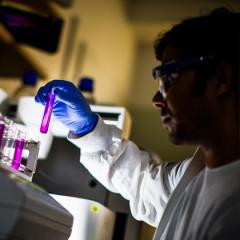On the scale of survivability, the outlook for oesophageal cancer is pretty bleak.
A diagnosis comes with about a 1 in 5 chance of making it another 5 years - on par with brain and liver cancer – but far below the 70 per cent survival rate for all cancers combined.

It doesn’t help, says AIBN PhD scholar Ramlah Khamis, that the gold standard testing method involves a tube being stuck down your throat.
That’s why she’s working on a better way.
“With oesophageal cancer, you’re really limited to an endoscopy - sticking a camera down your throat,” Ramlah says.

“No-one likes that. It is invasive. It is time consuming and costly for the medical system.
“And too often this means we see a delay in diagnosis.”
Instead, Ramlah sees a world where we simply need a blood or saliva sample.
In the journal ACS Applied Nano Materials, Ramlah and her colleagues Professor Matt Trau, Karthik Shanmugasundaram, Quan Zhou, Dr Jennifer Lu, Dr Zhen Zhang, Associate Professor Michelle Hill, Dr Alain Wuethrich, and Dr Abu Ali Ibn Sina describe a nanotechnology that could assist with timely, accurate, and non-invasive screening for oesophageal cancer and its pre-malignant condition, Barrett’s Oesophagus. Stay on top of our industry news and developments, events and opportunities, by joining The NetworkJoin The Network
The work was inspired from a collaboration between the laboratory of Associate Professor Hill at QIMR Berghofer, who had discovered a panel of unique markers in blood with a combination of protein and sugar signatures – specific to cancer; and the laboratory of Professor Trau who had developed a novel nanotechnology to readily read these unique biomarker signatures from a sample of blood.
The Multiplex SERS-Lectin-Immunoassay Ramlah developed with her colleagues is a streamlined version of the lab’s EndoScreen chip, a proof-of-concept technology designed to pick up certain biomarkers in the blood serum of cancer patients.
With a few tweaks, Ramlah was able to improve the diagnostic performance of the technology to tell whether a patient has oesophageal cancer, whether they have Barrett’s Oesophagus, or whether they are a healthy individual.

While further validation is needed from a larger testing cohort, Ramlah said the early results are promising for this innovative screening technology.
“We are early in the process, but it is still incredibly encouraging to see clearly defined results among our samples,” she said.
Read Ramlah’s research in ACS Applied Nano Materials here.


